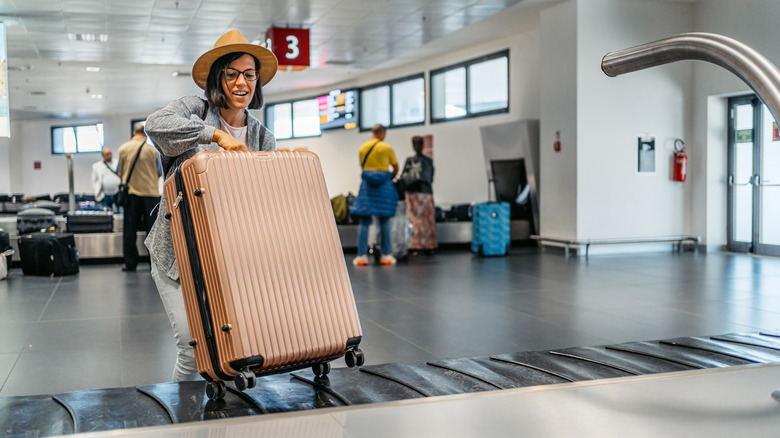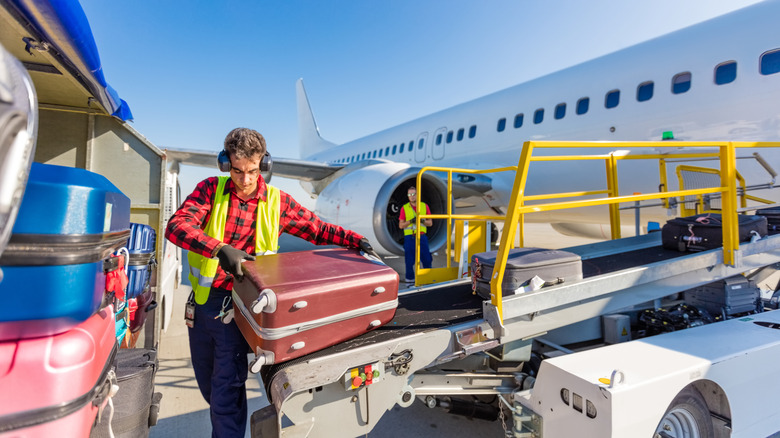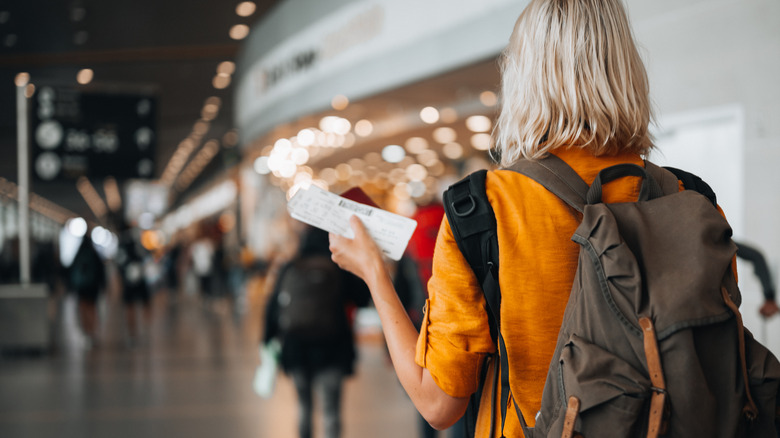The Easy Hack For Keeping Your Checked Luggage Safe May Be Too Good To Be True
We've all heard the horror stories of what goes on behind closed doors once your checked luggage hits the belt. From broken suitcases to missing items and even bags soaked in jet fuel, checking a bag is a game of luck where you're never really sure who's going to win — or if anyone's going to win, for that matter. The question remains, though: Is there anything you can do to make sure your luggage makes it to your destination unscathed? According to Condé Nast, slapping a fresh "Fragile" sticker on the bag might help.
However, it's worth noting that the "Fragile" sticker hack is nothing more than a special request, and it doesn't guarantee that there won't be any bumps or bruises along the way. After all, baggage handlers already have plenty of work on their hands that demands moving quickly, efficiently, and in time for takeoff. The often unsung heroes of air travel, handlers work under immense pressure, which means that they may or may not handle your suitcase with the extra care the sticker implies.
So, what's the secret if you genuinely want to protect your belongings? Unfortunately, the responsibility falls largely on your shoulders — and it all boils down to personal initiative and leveraging smart strategies to keep your things safe. After all, while travel inherently involves some level of uncertainty, ensuring the safety of your belongings is the one aspect that can be well within your control.
Protecting your checked luggage
While the "Fragile" sticker might not provide guaranteed protection, there are other practical ways to protect your things during a flight. First, there's hardside luggage. Depending on your travel style, these bags are a great option for long-haul trips because of their sturdy exterior, which provides a protective barrier against potential impact, rain, and other hazards during transit. This, along with wheels and handles that make them easier to maneuver, means they're more likely to sustain the hard hits of travel — although not without a few scuffs and scrapes.
Packing wisely is another great hack in ensuring your luggage survives the trip. Remember: The journey your suitcase takes is oftentimes anything but gentle, so preparation is key. Instead of just hoping for the best, a great way to secure your items — and save space — is by wrapping certain items individually in clothing to provide a reasonable amount of protection. For more fragile things such as glassware or electronics, consider going the extra mile and using bubble wrap. This material will provide a sturdier layer of cushioning that can absorb shocks and bumps when they happen.
Lastly, make sure to always secure your bags with TSA-approved locks. While these might not prevent your luggage from getting thrown around, locks can deter would-be thieves from rummaging through your bag. Plus, they also provide an added sense of security, leaving you free to enjoy your flight with peace of mind.
The hidden risks of checking your luggage
It's no secret that summer months typically bring a spike in travel volume, making it an even more hectic time for baggage handlers and increasing the risk of mishandled luggage. In fact, a September 2022 TripIt survey reported that 1 out of every 6 bags that pass through security over the summer is mishandled. Plus, to make matters even worse, Forbes reports that checked bags are 8 times more likely to be knocked around during international flights, too — meaning no itinerary is truly safe. And, along with mishandling, there's also the risk of losing time — from waiting at the carousel after a long flight to, even worse, dealing with the lost luggage department.
So, what's the solution? Most travelers agree that, when in doubt, packing light and bringing a carry-on is the way to go. Not only does traveling with a carry-on mean that your valuables and essential items are always by your side — minimizing potential losses — but also that you're handling your luggage the way you expect it to be treated. And with more control over your belongings, you can reduce the risk of accidental damage, losses, or your items ending up at the wrong destination.


